
At a Glance:
- Most hereditary breast cancers are caused by genetic mutations other than BRCA mutations
- Large-panel genetic testing makes it easier to screen women for non-BRCA mutations
- Genetic counselors are specially trained to know which genetic tests to order and how to interpret the results
- UVA genetic counselors are available to step in at any phase of patient evaluation.
As you’re likely aware, women with a family history of breast cancer have an increased risk of being diagnosed themselves. BRCA is the most well-known gene associated with hereditary breast cancer, but there are many others. In fact, BRCA1 and BRCA2 mutations are linked to 40 percent of hereditary breast cancers, so the majority are caused by mutations in other, non-BRCA1 or BRCA2 genes.
Perks of Large-Panel Genetic Testing
Fortunately, we now have the means to screen patients for BRCA, as well as these other gene mutations. Large-panel genetic testing has improved significantly over the past six years, according to UVA genetic counselor Martha Thomas, MS, LCGC.
“It’s getting easier and cheaper to order genetic testing, but the key is making sure the people ordering are educated about all the options. Ordering only BRCA1 and BRCA2 just isn’t appropriate anymore,” she says. “The larger panels enable us to look at all genes associated with cancer risk, so we can make sure we’re not missing a mutation that is very relevant to explaining personal history or family history.
“Also important to keep in mind is that genetic testing is typically billed under a single code, so screening for just one or two genes is missing an opportunity,” Thomas adds. “To get more comprehensive testing once that initial screening is done, patients may be required to pay out of pocket. The tests that I send out cover the full spectrum of potential mutations, so that we get all of the information we need the first time around.”
Who to Refer for Genetic Counseling
The guidelines regarding whom to refer for genetic testing for breast cancer are fairly complex. However, Thomas relies on a simple “3-2-1” formula. A woman who falls under one of the following categories should be referred to a genetic counselor who can help evaluate her family history of breast and other cancers, and discuss the need for screening.
A referral for genetic counseling is appropriate for:
- Women with 3 members of her family diagnosed with breast cancer, regardless of age upon diagnosis; or a woman with a family history of a combination of related cancers, including breast, ovarian and pancreatic
- Women with 2 female relatives who have been diagnosed with breast cancer, with one diagnosed before age 50
- Women with 1 relative diagnosed with breast cancer under age 45 or women with 1 male relative diagnosed with breast cancer regardless of age.
Because of the advances in large-panel genetic testing, some women who were screened longer than six years ago also should consider being re-tested, advises Thomas.
“I always emphasize these are guidelines, not set-in-stone lines,” she says. “By sitting down with patients, genetic counselors can help them interpret the guidelines, taking into consideration each woman’s personal and family history.”
In addition, Thomas cautions patients and providers from making assumptions about negative genetic testing results. “Just because a patient’s genetic test comes back negative doesn’t mean their risk of breast cancer is average,” she says. “I can provide example after example when that hasn’t been the case.”
For patients with a strong family history of cancer, the UVA High Risk Breast and Ovarian Program at UVA Cancer Center may be a really valuable resource, says Thomas. “This clinic has providers skilled at more fully analyzing a patient’s family history and personal risk of breast cancer even when genetic testing is negative. We know genetic testing results are only one piece of a woman’s breast cancer risk,” she says.
Why Refer to a UVA Genetic Counselor
UVA genetic counselors have experience with large-panel tests, so they can interpret the results and translate them into clinical recommendations, which can often be a challenge. They have a full hour with patients to counsel them on their test results and, as an added benefit, the genetic counseling team handles all of the insurance billing and any snafus that arise.
UVA genetic counselors are always available to step in at any phase of a patient evaluation and will work with referring physicians to ensure patients are well informed of their options for testing and the recommended approach to treatment.
To refer a patient to UVA Cancer Center, call UVA Physician Direct at 800.552.3723.